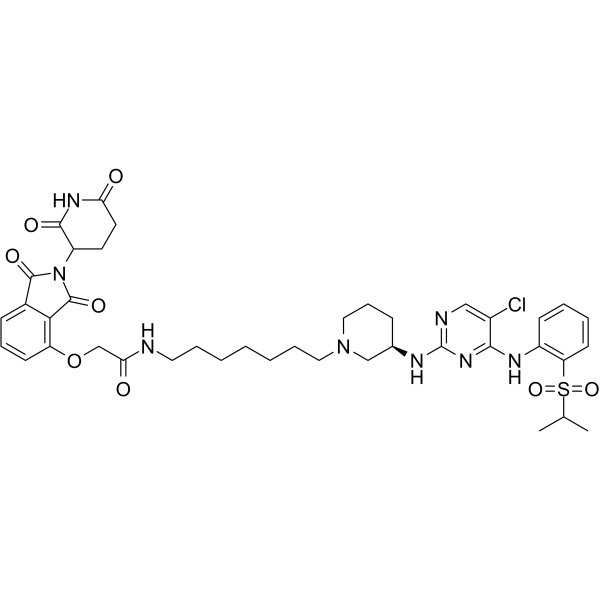BSJ-4-116 |
| Catalog No.GC62263 |
BSJ-4-116 is a PROTAC connected by ligands for Cereblon and CDK. BSJ-4-116 is a highly potent and selective CDK12 degrader (PROTAC) with an IC50 of 6 nM. BSJ-4-116 downregulates DDR genes through a premature termination of transcription, primarily through increasing poly(adenylation). BSJ-4-116 exhibits potent antiproliferative effects, alone and in combination with the poly(ADP-ribose) polymerase inhibitor Olaparib.
Products are for research use only. Not for human use. We do not sell to patients.

Cas No.: 2519823-34-6
Sample solution is provided at 25 µL, 10mM.
BSJ-4-116 is a highly potent and selective CDK12 degrader (PROTAC) with an IC50 of 6 nM. BSJ-4-116 downregulates DDR genes through a premature termination of transcription, primarily through increasing poly(adenylation). BSJ-4-116 exhibits potent antiproliferative effects, alone and in combination with the poly(ADP-ribose) polymerase inhibitor Olaparib [1].
BSJ-4-116 (10-10000 nM; 72 hours) exhibits potent antiproliferative effects in Kelly CDK12C1039F[1].BSJ-4-116 (50 nM; 6-24 hours) decreases the level of CDK12 protein, regardless of the mutational status of the cell line[1].BSJ-4-116 inhibits the growth of T-ALL cells (Jurkat and MOLT-4 cells) and sensitizes them to PARP inhibition[1]. BSJ-4-116 regulates DDR genes via poly(adenylation). BSJ-4-116 overcomes CDK12C1039F mutation. BSJ-4-116 represents the first example of resistance to a bivalent degrader molecule that is a consequence of an acquired point mutation in the target protein[1].
[1]. Jiang B, et al. Discovery and resistance mechanism of a selective CDK12 degrader. Nat Chem Biol. 2021;17(6):675-683.
Average Rating: 5 (Based on Reviews and 35 reference(s) in Google Scholar.)
GLPBIO products are for RESEARCH USE ONLY. Please make sure your review or question is research based.
Required fields are marked with *




















